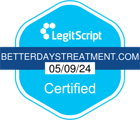Dual diagnosis treatment refers to a comprehensive approach to treating individuals who are dealing with both a substance use disorder (such as alcohol or drug addiction) and a co-occurring mental health disorder (such as depression, anxiety, bipolar disorder, or schizophrenia). It recognizes that these conditions often interact and influence each other, making it important to address both issues simultaneously for effective treatment and recovery.
Individuals with a dual diagnosis face unique challenges in their recovery journey. Substance use and mental health disorders can exacerbate each other’s symptoms, creating a cycle where one condition worsens the other. For example, someone with a mental health disorder might use substances as a way to cope with their symptoms, which can lead to addiction. On the other hand, substance abuse can trigger or worsen mental health symptoms.
Components of Dual diagnosis treatment:
Dual diagnosis treatment aims to provide integrated and coordinated care that addresses both conditions simultaneously. A thorough evaluation is conducted to identify the specific substance use and mental health disorders an individual is dealing with, as well as their severity and how they interact.
Individualized Treatment Plan: Dual diagnosis treatment
A personalized treatment plan is developed that takes into account the unique needs and challenges of the individual. This plan might include therapies, medications, support groups, and other interventions.
Therapy & Medication: Dual diagnosis treatment
Various types of therapy are used to address both substance use and mental health disorders. These can include cognitive-behavioral therapy (CBT), dialectical behavior therapy (DBT), motivational interviewing, and more. If appropriate, medications may be prescribed to manage mental health symptoms and cravings associated with substance use disorders. Peer support groups, family therapy, educational programs, and other resources are often included to provide a comprehensive support network. Strategies are taught to help individuals cope with triggers and stressors that could lead to a relapse in either their substance use or mental health symptoms. Dual diagnosis treatment focuses on long-term recovery and management.
This may involve ongoing therapy, medication management, and lifestyle changes. Collaborative efforts between mental health professionals, addiction specialists, and other healthcare providers ensure that both disorders are addressed holistically.
Successful dual diagnosis treatment requires a well-coordinated and individualized approach. Treating both the substance use disorder and the mental health disorder concurrently increases the chances of lasting recovery and improved overall well-being for individuals with dual diagnoses.

